North Korea leader's sister to make landmark visit to South for Olympics
- Published
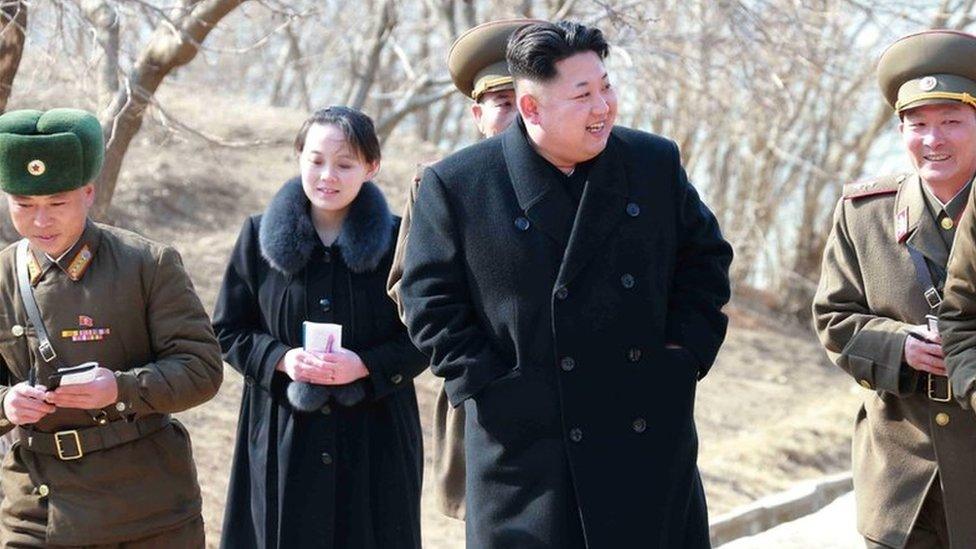
Kim Yo-jong in a 2015 picture of her brother touring a military unit
The influential sister of North Korean leader Kim Jong-un is to attend the Winter Olympic Games which open in Pyeongchang in the South on Friday, ministers in Seoul say.
Kim Yo-jong, a senior Workers' Party official promoted to the politburo last year, will be the first immediate Kim family member to cross the border.
Both Koreas will march under one flag at the opening ceremony.
The North's participation has been seen as a thawing of bilateral ties.
However, the US, Japan and others have accused the North of using the Games for propaganda purposes.
Who is Kim Yo-jong?
Believed to have been born in 1987, she is the youngest daughter of late leader Kim Jong-il and is Kim Jong-un's full sister. She is about four years younger than her brother and is said to be very close to him.
She is reportedly married to the son of Choe Ryong-hae, the powerful party secretary.
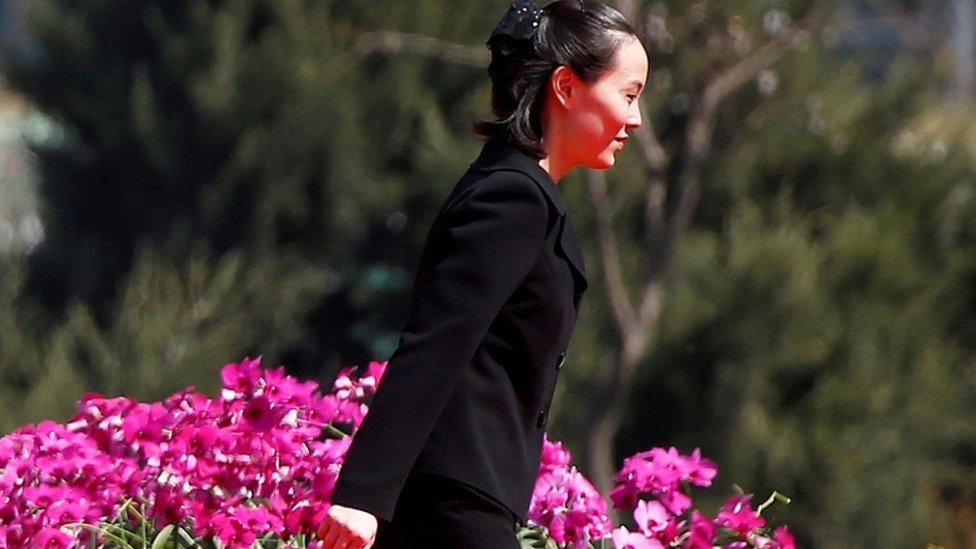
Kim Yo-jong at the opening of a residential complex in Pyongyang in 2017
Kim Yo-jong has been in the spotlight sporadically in recent years, with her main job being to protect her brother's image via her role in the party's propaganda department.
She remains blacklisted by the US over alleged links to human rights abuses in North Korea.

A message from her brother?
Analysis: BBC's Laura Bicker in Seoul
This is a huge surprise. There had been speculation Kim Yo-jong might be part of the delegation but few thought it would actually happen. It is being seen as a sign that Kim Jong-un is serious about improving ties with South Korea.
Kim Yo-jong is one of Kim Jong-un's closest aides and some are speculating that she might be bringing a message from her brother.
But there could be a number of obstacles to overcome if she is to make it to Pyeongchang. She is targeted by US sanctions for alleged human rights abuses, although she is not on the UN Security Council travel blacklist.
There is also the question of how she will get to the Games. Seoul has had to request special permission from the US and others in the international community to allow North Korean athletes and performers to travel south by bus and ferry. They may have to do so again and this time it will be for a member of Kim Jong-un's own family.

How rare is this visit?
It would be the first by a direct member of the Kim dynasty.
Chang Song-thaek, Kim Jong-un's uncle and brother in law of Kim Jong-il, did travel to the South but did not belong to the Baekdu blood line, which is considered significant.
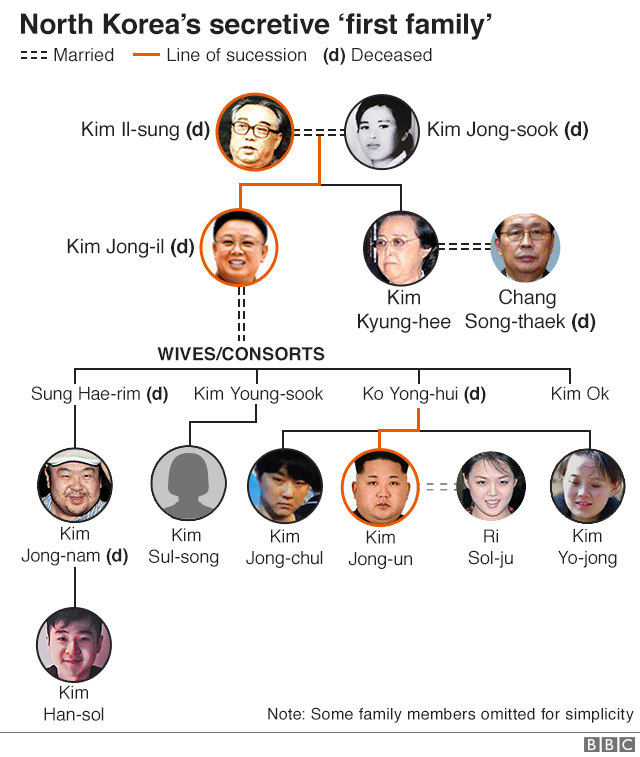
There is speculation in the South that this is part of Kim Yo-jong's grooming for greater power, and that she could be bringing a letter from her brother to South Korean President Moon Jae-in, who she is likely to meet.
It is unclear whether Kim Yo-jong will be at the opening ceremony on Friday.
Who else is in the delegation?
Politically, four figures, including Kim Yo-jong, are key. The others are:
Kim Yong-nam. North Korea's ceremonial head of state, the president of its parliament. The diplomatically sure-footed 90-year-old has seen the rule of all three North Korean leaders and has travelled overseas before
Ri Son-gwon. The head of the North Korean state agency in charge of inter-Korean affairs. A veteran negotiator, he was North Korea's chief delegate at the rare inter-Korean talks held in January
Choe Hwi. Vice-chairman of the Central Committee of the Workers' Party and chairman of the National Sports Guidance Committee. Under US state department sanctions
And the rest of the North Korean team?
It's a 280-strong delegation, most of whom arrived in the South on Wednesday.
Led by North Korean Sports Minister Kim Il-guk, it includes 229 cheerleaders, four officials from the National Olympic Committee, 26 taekwondo demonstrators and 21 journalists.
North Korean cheerleaders arrive in the South for the Games
The team arrived via a western border at 09:28 local time (00:26 GMT), the Yonhap news agency reported.
Only 10 athletes will compete for the North at the Games, along with another 12 as part of a unified Korean women's ice hockey team.

Drip, drip, drip of PR
Michael Madden, North Korea leadership expert
In announcing its delegates both to the 2018 Winter Olympics and the inter-Korean culture events on the sidelines, Pyongyang let out the information in a slow drip.
Part of this is Pyongyang maximising the positive PR effects. The announcement of the full delegation came following the arrival of its athletes to the Games late last week, and one day after 10 musicians arrived in South Korea.
So now North Korea has earned itself a third day of positive media coverage about its participation in the Olympics.

How have others reacted?
The US is scornful of the North's motives over the Olympics and is sending Vice-President Mike Pence to the opening ceremony in Pyeongchang to counter what it terms propaganda.
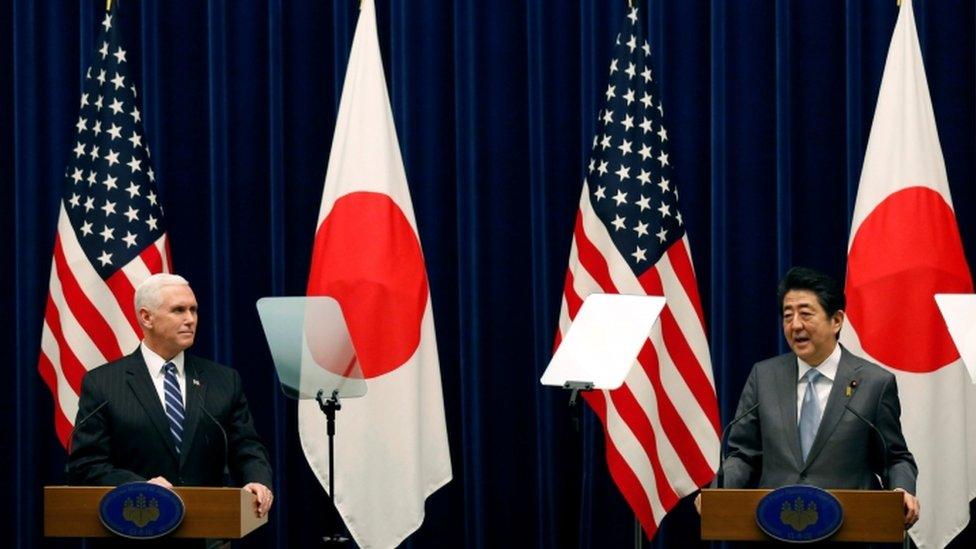
Both the US and Japan have been critical of the North's Olympics policy
"We're travelling to the Olympics to make sure that North Korea doesn't use the powerful symbolism in the backdrop of the Winter Olympics to paper over the truth about their regime," he said.
He was in Tokyo on Wednesday and maintained the pressure, announcing that "the United States will soon unveil the toughest and most aggressive round of economic sanctions on North Korea".
Japan has been equally sceptical. Chief Cabinet Secretary Yoshihide Suga said: "We must not be fooled by North Korea's 'smile diplomacy'."
Where are we on North-South ties?
North Korea currently faces growing international pressure and sanctions over its nuclear and missile programmes.
Its latest ballistic missile test, on 28 November, sparked a new series of measures from the UN, targeting petrol shipments and travel for North Koreans, and a war of words between the North and US President Donald Trump.
Kim Jong-un then extended a New Year's olive branch to the South over participation in the Olympics, which run from 9 to 25 February.
The perceived warming of ties has not been without difficulties, not least the North's decision to move a military parade in Pyongyang from April to the day before the opening of the Games.
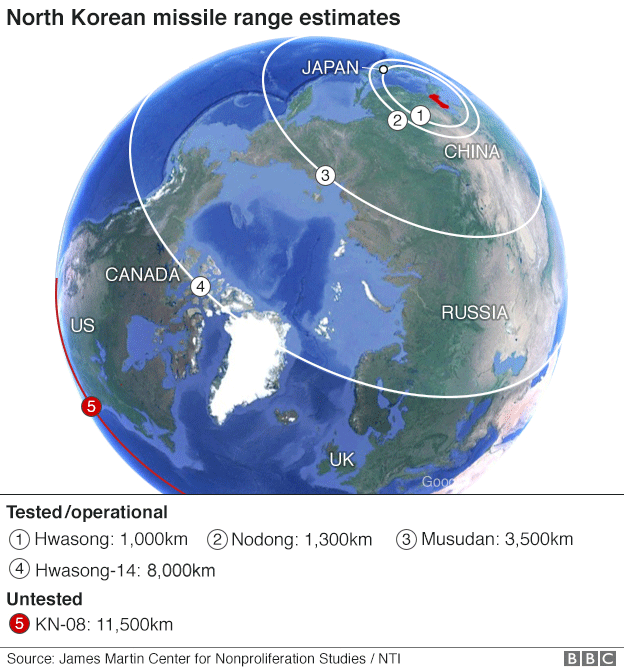
- Published16 June 2020
